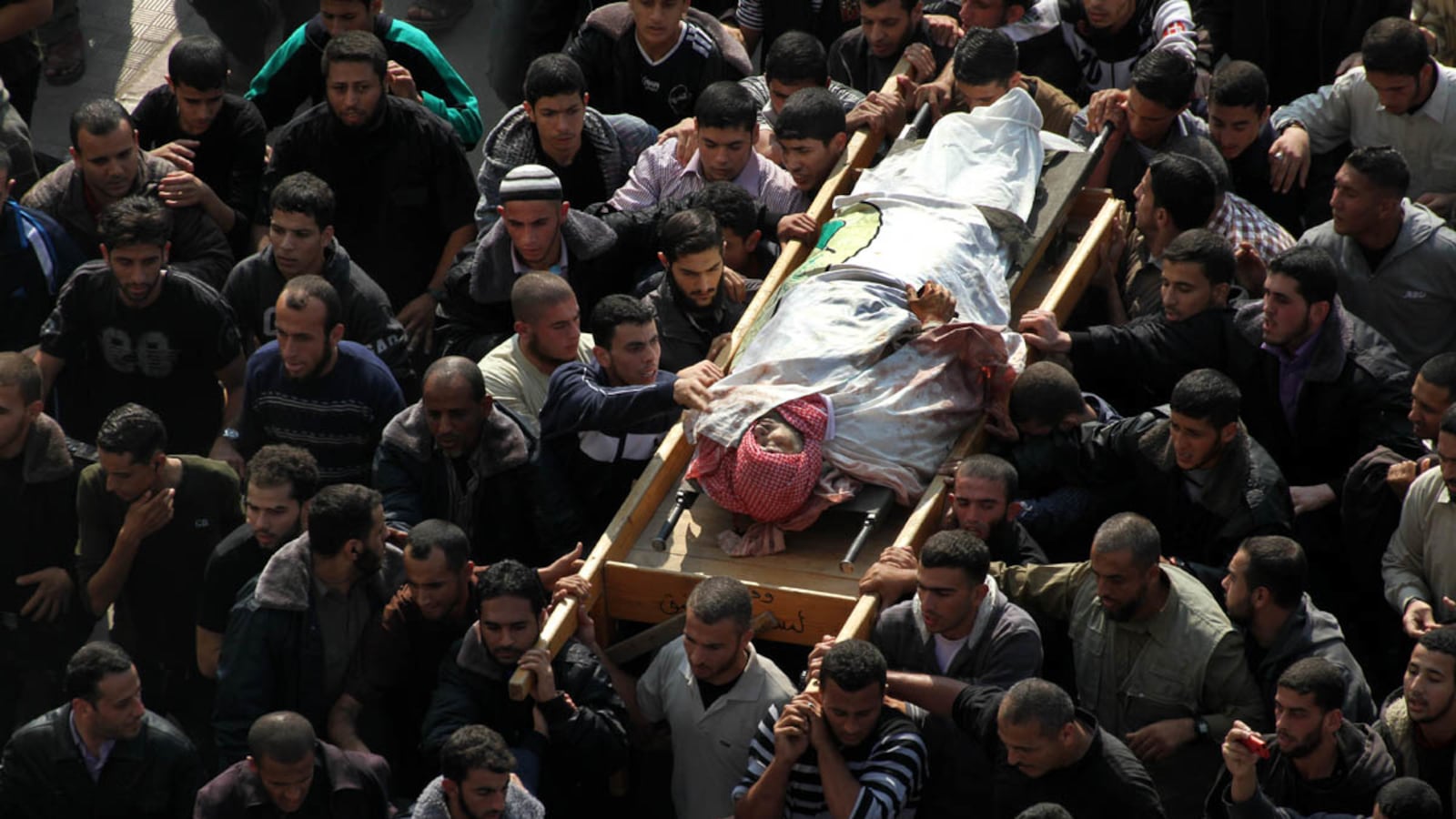If Israelis were bracing for a huge protests across the Middle East and harsh diplomatic measures in response to their offensive against Gaza, the Arab reaction so far has been fairly tepid, even as images circulate] of a Palestinian baby apparently burned to death in one of the Israeli assaults.

Egypt’s Islamic-led government issued the sharpest rebuke, recalling its ambassador from Tel Aviv a few hours after the first Israeli air strike, which killed the military commander of the Islamic Hamas group, Ahmed Jabari. A few hundred Egyptians protested in Cairo, carrying Palestinian flags and chanting “Palestinian blood is our blood.”
But the military campaign did not seem to immediately jeopardize Israel’s 33-year-old peace treaty with Egypt, as some Israeli analysts had warned. And in other countries around the region, protests were either small or nonexistent.
The Israeli operation is only in its second day. If Palestinian fatalities mount, the dissent will build as well. So far, 11 Palestinians and three Israelis have been killed in the fighting, which has included more than 100 Israeli air strikes and some 200 Palestinian rocket attacks.
But for now, the Arabs appear to be too preoccupied with their own problems, many of them springing from the insurrections that erupted in the region two years ago, to give Gaza much attention.
“There’s always anger at Israel but I think it’s not as much of a priority as other issues that Egyptians are worried about,” says Abdel Monem Said Aly, a political scientist at the Regional Center for Strategic Studies in Cairo.
“We have economic problems, constitutional problems, crime, a whole list of issues that came as a result of the changes in Egypt [over the past two years],” he told The Daily Beast.
Aly said the response so far from Egyptian President Mohamed Morsi was not much different from what he would have expected from Hosni Mubarak, the ousted autocrat who ruled Egypt for three decades.
Mubarak maintained regular contact and security coordination with Israel, something Morsi has largely broken off. But he also frequently criticized Israeli governments for their treatment of the Palestinians, twice recalling Egyptian ambassadors from Tel Aviv.
Egypt’s Muslim Brotherhood, which has close ties to Hamas, called yesterday for a severing of relations with Israel in response to the offensive. But Morsi, who had been among the leaders of the movement until he was elected Egypt’s president earlier this year, said only that the Israeli attacks must cease.
"The Israelis must understand that we do not accept this aggression, which could lead to instability in the region," he said in televised remarks.
Jordan, the only other country in the region that has a peace treaty with Israel, also condemned the Gaza assault, with a spokesman warning that it would “drag the region into the cycle of violence and instability again.”
But the Jordanian government has been mostly focused in the past week on the turmoil in its own country, where thousands have taken to the streets to protest the rising price of gasoline. The unrest poses a challenge to the reign of King Abdullah, who has managed so far to dampen any Arab Spring spirit in Jordan.
Turkey’s relatively measured response has been perhaps the biggest surprise. Officials in Ankara led the criticism against Israel during its previous assault on Gaza in the winter of 2008-2009, Cast Lead, which killed more than 1300 Palestinians. Marc Lynch, the Middle East expert from George Washington University, suggested yesterday in a tweet that “Egypt and Turkey could get into a bidding competition over Gaza if Israeli attack continues.”
But other analysts noted that Turkey’s own circumstances had changed since Cast Lead, chiefly its war against the Kurdistan Workers Party (PKK), which has heated up since the summer and caused civilian casualties.
“While I expected Turkey to issue a condemnation of Israeli actions, it is not surprising that it did not have the full force as it has in the past given the uncomfortable parallels that exist between Israel's actions against Hamas and Turkey's actions against the PKK,” wrote Michael Koplow on the The Atlantic yesterday.
The war itself is still evolving and so will the responses. Israel has not ruled out a ground operation in Gaza, which would surely raise the casualty toll and stoke Arab anger. A regime like Jordan might decide to encourage protests against Israel by way of distracting people from the shortcomings of its own governance.But for now, countries in the region are focused on their own issues.
“I think if Israel were to push into Egyptian territory, then we would have no choice but to take serious measures,” said Aly, the Egyptian political scientist.
“Short of that, I think Egypt will stick to wise diplomatic steps.”





